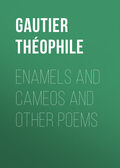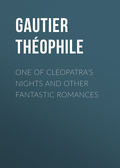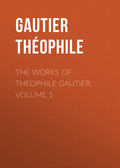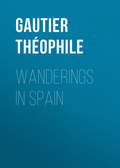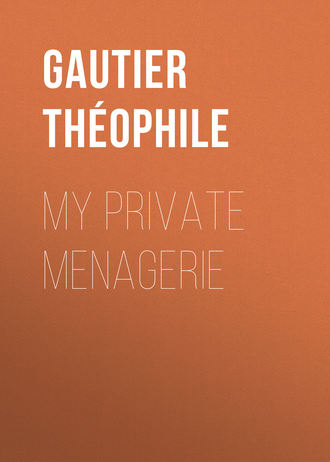
Gautier Théophile
My Private Menagerie
III
THE BLACK DYNASTY
Don Pierrot of Navarre, being a native of Havana, required a hot-house temperature, and he enjoyed it in the house; round the dwelling, however, stretched great gardens, separated by open fences through which a cat could easily make its way, and rose great trees in which twittered, warbled, and sang whole flocks of birds; so that sometimes Pierrot, profiting by a door left open, would go out at night and start on a hunt, rambling through the grass and flowers wet with dew. In such cases he would have to await daylight to be let in, for although he would come and miaoul under our windows, his appeals did not always awaken the sleepers in the house. He had a delicate chest, and one night, when it was colder than usual, he caught a cold which soon turned into consumption. After coughing for a whole year poor Pierrot became thin and emaciated, and his coat, formerly so silky, had the mat whiteness of a shroud. His great transparent eyes had become the most important feature in his poor shrunken face; his red nose had turned pale, and he walked with slow steps, in a melancholy fashion, by the sunny side of the wall, watching the yellow autumn leaves whirling and twisting. One could have sworn he was reciting to himself Millevoye’s elegy. A sick animal is a very touching object, for it bears suffering with such gentle and sad resignation. We did all we could to save him; I called in a very skilful physician who tested his chest and felt his pulse. Ass’s milk was prescribed, and the poor little creature drank it willingly enough out of his tiny china saucer. He would remain for hours at a time stretched out on my knee like the shadow of a sphinx; I could feel his vertebræ like the grains of a chaplet, and he would try to acknowledge my caresses with a feeble purr that sounded like a death-rattle. On the day he died, he lay on his side gasping, but got himself up by a supreme effort, came to me, and opening wide his eyes, fixed upon me a glance that called for help with intense supplication. He seemed to say to me, “You are a man; do save me.” Then he staggered, his eyes already glazed, and fell to the ground, uttering so woeful, so despairing, so anguished a cry that it filled me with mute horror. He was buried at the foot of the garden, under a white rosebush that still marks the place of his tomb.
Séraphita died two or three years later, of croup, which the physician was unable to master. She rests not far from Pierrot.
With her ended the White Dynasty, but not the family. From that pair of snow-white cats had sprung three coal-black kittens, a mystery the solution of which I leave to others. Victor Hugo’s “Les Misérables” were then all the rage, and the names of the characters in the novel were in every one’s mouth. The two little male cats were called Enjolras and Gavroche, and the female Eponine. They were the sweetest of kittens, and we trained them to fetch and carry pieces of paper thrown at a distance just as a dog would do. We got so far as to throw the paper ball on the top of wardrobes, or to hide it behind boxes or in tall vases, and they would retrieve it very prettily with their paws. On attaining years of discretion, they forsook these frivolous sports and resumed the dreamy, philosophical calm which is the real characteristic of cats.
All negroes are alike to people who land in a slave-owning country in America, and it is impossible for them to tell one from another. So, to those who do not care for them, three black cats are three black cats and nothing more. But an observing eye makes no such mistake. The physiognomies of animals are as different as those of men, and I could always tell to which particular cat belonged the black face, as black as Harlequin’s mask, and lighted by emerald disks with golden gleams.
Enjolras, who was by far the handsomest of the three, was marked by his big lion-like head and well whiskered cheeks, by his muscular shoulders, his long back, and his splendid tail, fluffy as a feather duster. There was something theatrical and grandiloquent about him, and he seemed to pose like an actor who attracts admiration. His motions were slow, undulating, and full of majesty; he seemed to be always stepping on a table covered with china ornaments and Venetian glass, so circumspectly did he select the place where he put down his foot. He was not much of a Stoic, and exhibited a liking for food which his namesake would have had reason to blame. No doubt Enjolras, the pure and sober youth, would have said to him, as the angel did to Swedenborg, “You eat too much.” We rather encouraged this amusing voracity, analogous to that of monkeys, and Enjolras grew to a size and weight very uncommon among domestic cats. Then I bethought myself of having him shaved in the style of poodles, in order to bring out completely his leonine appearance. He retained his mane and a long tuft of hair at the end of the tail, and I would not swear that his thighs were not adorned with mutton-chop whiskers like those Munito used to wear. Thus trimmed, he resembled, I must confess, a Japanese monster much more than a lion of the Atlas Mountains or the Cape. Never was a more extravagant fancy carried out on the body of a living animal; his closely clipped coat allowed the skin to show through, and its bluish tones, most curious to note, contrasted strangely with his black mane.
Gavroche was a cat with a sharp, satirical look, as if he intended to recall his namesake in the novel. Smaller than Enjolras, he was endowed with abrupt and comical agility, and in the stead of the puns and slang of the Paris street-Arab, he indulged in the funniest capers, leaps, and attitudes. I am bound to add that, yielding to his street instincts, Gavroche was in the habit of seizing every opportunity of leaving the drawing-room and going off to join, in the court, and even in the public streets, numbers of wandering cats, “of unknown blood and lineage low,” with whom he took part in performances of doubtful taste, completely forgetful of his dignified rank as a Havana cat, the son of the illustrious Don Pierrot of Navarre, a grandee of Spain of the first class, and of the Marchioness Séraphita, noted for her haughty and aristocratic manners.
Sometimes he would bring in to his meals, in order to treat them, consumptive friends of his, so starved that every rib in their body showed, having nothing but skin and bones, whom he had picked up in the course of his excursions and wanderings, for he was a kind-hearted fellow. The poor devils, their ears laid back, their tails between their legs, their glance restless, dreading to be driven from their free meal by a housemaid armed with a broom, swallowed the pieces two, three, and four at a time, and like the famous dog, Siete Aguas (Seven Waters), of Spanish posadas, would lick the platter as clean as if it had been washed and scoured by a Dutch housekeeper who had served as model to Mieris or Gerard Dow. Whenever I saw Gavroche’s companions, I remembered the lettering under one of Gavarni’s drawings: “A nice lot, the friends you are capable of proceeding with!” But after all it was merely a proof of Gavroche’s kindness of heart, for he was quite able to polish off the plateful himself.
The cat who bore the name of the interesting Eponine was more lissome and slender in shape than her brothers. Her mien was quite peculiar to herself, owing to her somewhat long face, her eyes slanting slightly in the Chinese fashion, and of a green like that of the eyes of Pallas Athene, on whom Homer invariably bestows the title of γλαυκῶπις, her velvety black nose, of as fine a grain as a Perigord truffle, and her incessantly moving whiskers. Her coat, of a superb black, was always in motion and shimmered with infinite changes. There never was a more sensitive, nervous, and electric animal. If she were stroked two or three times, in the dark, blue sparks came crackling from her fur. She attached herself to me in particular, just as in the novel Eponine becomes attached to Marius. As I was less taken up with Cosette than that handsome youth, I accepted the love of my affectionate and devoted cat, who is still the assiduous companion of my labours and the delight of my hermitage on the confines of the suburbs. She trots up when she hears the bell ring, welcomes my visitors, leads them into the drawing-room, shows them to a seat, talks to them – yes, I mean it, talks to them – with croonings and cooings and whimpers quite unlike the language cats make use of among themselves, and which simulate the articulate speech of man. You ask me what it is she says? She says, in the plainest possible fashion: “Do not be impatient; look at the pictures or chat with me, if you enjoy that. My master will be down in a minute.” And when I come in she discreetly retires to an arm-chair or on top of the piano, and listens to the conversation without breaking in upon it, like a well-bred animal that is used to society.
Sweet Eponine has given us so many proofs of intelligence, kindly disposition, and sociability that she has been promoted, by common consent, to the dignity of a person, for it is plain that a higher order of reason than instinct guides her actions. This dignity entails the right of eating at table like a person, and not from a saucer in a corner, like an animal. So Eponine’s chair is placed beside mine at lunch and dinner, and on account of her size she is allowed to rest her fore paws upon the edge of the table. She has her own place set, without fork or spoon, but with her glass. She eats of every course that is brought on, from the soup to the dessert, always waiting for her turn to be served and behaving with a discretion and decency that it is to be wished were more frequently met with in children. She turns up at the first sound of the bell, and when we enter the dining-room we are sure to find her already in her place, standing on her chair, her paws on the edge of the table, and holding up her little head to be kissed, like a well-bred young lady who is polite and affectionate towards her parents and her elders.
The sun has its spots, the diamond its flaws, and perfection itself its little weak points. Eponine, it must be owned, has an overmastering fondness for fish, a taste she shares in common with all her race. The Latin proverb, Catus amat pisces, sed non vult tingere plantas, to the contrary notwithstanding, she is always ready to pop her paw into the water to fish out a blay, a small carp, or a trout. Fish makes her well-nigh delirious, and like children eagerly looking for the dessert, she is apt to object to the soup, when the preliminary investigations she has carried on in the kitchen have enabled her to ascertain that the fish has duly come in and that there is no reason why Vatel should run himself through with his sword. In such cases we do not help her to fish, and I remark to her, in a cold tone, “A lady who has no appetite for soup cannot have any appetite for fish,” and the dish is remorselessly sent past her. Then seeing that it is no joking matter, dainty Eponine bolts her soup in hot haste, licks up the very last drop of the bouillon, puts away the minutest crumb of bread or Italian paste, and turns round to me with the proud look of one conscious of being without fear or reproach and of having fulfilled her duty. Her share of the fish is handed to her, and she despatches it with every mark of extreme satisfaction. Then, having tasted a little of every dish, she winds up her meal by drinking one-third of a glassful of water.
If we happen to have guests at dinner, Eponine does not need to have seen them enter to be aware that there is to be company. She simply looks at her place, and if she sees a knife, fork, and spoon laid there, she makes off at once and perches on the piano stool, her usual place of refuge in such cases. Those who deny reasoning powers to animals may explain this fact, so simple apparently, yet so suggestive, as best they may. That judicious and observant cat of mine deduces from the presence by her plate of utensils which man alone understands how to use that she must give up her position for that day to a guest, and she forthwith does so. Never once has she made a mistake. Only, when she is well acquainted with the particular guest, she will climb upon his knee and seek, by her graceful ways and her caresses, to induce him to bestow some tit-bit upon her.
But enough of this; I must not weary my readers, and stories of cats are less attractive than stories about dogs. Yet I deem that I ought to tell of the deaths of Enjolras and Gavroche. In the Latin Rudiments there is a rule stated thus: Sua eum perdidit ambitio. Of Enjolras it may be said: Sua eum perdidit pinguitudo, that is, his admirable condition was the cause of his death. He was killed by idiotic fanciers of jugged hare. His murderers, however, perished before the end of the year in the most painful manner; for the death of a black cat, an eminently cabalistic animal, never goes unavenged.
Gavroche, seized with a frantic love of freedom, or rather with a sudden attack of vertigo, sprang out of the window one day, crossed the street, climbed the fence of the Parc Saint-James, which faces our house, and vanished. In spite of our utmost endeavours, we never managed to hear of him again, and a shadow of mystery hangs over his fate; so that the only survivor of the Black Dynasty is Eponine, who is still faithful to her master and has become a thorough cat of letters.



